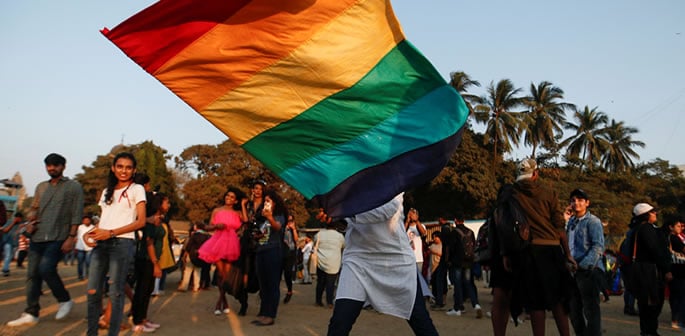Will India Legalise Same-Sex Marriage?

India’s Supreme Court is currently hearing final arguments in a historic group of petitions aimed at legalising same-sex marriage in the country.
This case, which is a consolidation of cases brought by several LGBTQ couples, is being opposed by the government of Prime Minister Narendra Modi.
The petitioners argue that denying the right to marry a person of one’s own choice to LGBTQ citizens is discriminatory and that they are being denied the same legal rights as heterosexual couples.
The hearings have been live-streamed online, and it is not clear when or how the five-judge panel will rule.
With the arguments remaining inconclusive, the Constitution Bench led by Chief Justice of India DY Chandrachud and also comprising Justices Sanjay Kishan Kaul, S Ravindra Bhat, PS Narasimha and Hima Kohli, will resume hearings on April 24, 2023.
In 2012, it was estimated that there were 2.5 million LGBTQ Indian citizens.
Now, it could be more than 135 million people.
A favourable decision, in this case, would make India the 35th country worldwide and the second place in Asia to allow marriage equality after Taiwan’s parliament passed such a bill in 2019.
It would also mean an overhaul of many Indian laws governing things like parenthood, inheritance, alimony and divorce.
Although India’s Supreme Court decriminalised gay sex in 2018 and expanded protections for “atypical” families in 2022, the LGBTQ community still lacks equal rights when it comes to things like inheritance, divorce, property ownership and adoption.
Current Indian law only recognises one member of a same-sex couple as a parent, either because they gave birth to their child or adopted them as a single parent.
Plaintiffs in the ongoing case argue that they are being discriminated against by being denied the same legal rights as straight married couples.
For example, same-sex couples are unable to get a joint bank account or health insurance or own a house together because their union is not recognised in Indian law.
Aditi Anand and Susan Dias, who are plaintiffs in the case, have said that they are fighting for marriage equality because they do everything heterosexual couples do, but without legal security.
This includes raising their toddler.
India’s socially conservative government is against the legalisation of same-sex marriage and questions whether the court has the right to decide it at all, preferring that parliament decide the matter.
The government previously called same-sex marriage an “urban elitist view”.
Prime Minister Modi’s position is that same-sex relationships can’t be compared to the sacred Indian family concept of “a wife, a husband and children born out of the union”.
The government rejects the argument that marriage equality is a fundamental right, even writing in a recent filing that the “petitions merely reflect urban elitist views”, which has evoked strong reactions from the LGBTQ community and beyond.
Other religious leaders have also joined together to oppose the legislation, raising concerns about what it would mean for procreation and the “natural family order”.
One religious group told the court that the concept of same-sex marriage would essentially “attack” the Indian family system, arguing that if legalised, same-sex marriages will dilute the concept of marriage and bring in a free-floating system that will be harmful to the social order.
However, the Indian Psychiatric Society, the country’s largest organisation of mental health professionals, issued a statement reiterating that homosexuality is not a disease and that denying people their civil rights may lead to mental health issues.
An important step in India’s LGBTQ rights movement was made in 2018 with the repeal of a colonial-era law that criminalises homosexuality, thanks to a landmark decision by the country’s highest court.
The ongoing same-sex marriage case is seen as another significant step forward for LGBTQ rights in India.